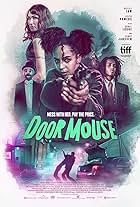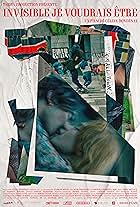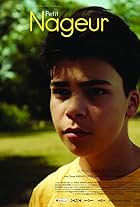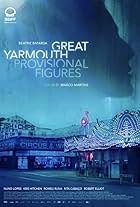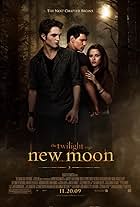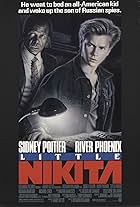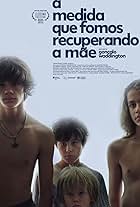
Psycho_sano
Joined Oct 2016
Welcome to the new profile
We're still working on updating some profile features. To see the badges, ratings breakdowns, and polls for this profile, please go to the previous version.
Ratings81
Psycho_sano's rating
Reviews14
Psycho_sano's rating
With a dark and visually striking narrative, Jogia plunges the audience into a neo-noir world filled with tension, mystery, and incisive social commentary on the exploitation of women. The film is a cinematic experience that combines style, substance, and meticulous art direction, resulting in a work that resonates deeply.
At the heart of the story is Hayley Law, who plays Mouse, a young fighter and cartoonist who becomes entangled in a dangerous investigation after the disappearance of a friend. Law delivers a visceral and nuanced performance, capturing the vulnerability and determination of her character with an intensity that keeps the audience glued to the screen. Her chemistry with the veteran Famke Janssen, who plays the enigmatic owner of a strip club, is electric. Janssen, with her magnetic presence and subtle delivery, adds layers of complexity to the film, while Keith Powers, as the charming and mysterious Ugly, complements the cast with a solid and convincing performance.
Jogia demonstrates a sharp eye for visual details, using cinematography to amplify the emotions and themes of the story. The choice to frequently focus on Mouse's eyes not only humanizes the character but also creates an intimate connection with the audience. The lighting is another highlight, with plays of light and shadow that evoke a claustrophobic and dreamlike atmosphere. In particular, the way Mouse's hair is lit to resemble the silhouette of Mickey Mouse's head is a brilliant visual metaphor, suggesting the duality between innocence and danger, fantasy and reality.
Mouse's room, which serves as her refuge and creative space, is a microcosm of the chaos that takes over her life. Throughout the film, we see the environment transform into a disordered and oppressive space, reflecting the protagonist's mental and emotional deterioration. This production design choice is a notable success, reinforcing the film's central theme: the loss of innocence and the struggle against dark, systemic forces.
The soundtrack, in turn, is a character in its own right. With a combination of melancholic jazz, electronic beats, and dissonant tones, the music amplifies the neo-noir atmosphere, transporting the viewer to a universe where the line between right and wrong is constantly blurred. The film's setting is impeccable, with scenes ranging from decadent clubs to dark, labyrinthine streets, creating a world that feels alive and tangible.
Door Mouse is not just a film about an investigation; it is a courageous exploration of difficult themes, such as sexual exploitation and violence against women. Jogia approaches these subjects with sensitivity and without sensationalism, allowing the story and characters to speak for themselves. The film is disturbing but necessary, and its message resonates long after the credits roll.
At the heart of the story is Hayley Law, who plays Mouse, a young fighter and cartoonist who becomes entangled in a dangerous investigation after the disappearance of a friend. Law delivers a visceral and nuanced performance, capturing the vulnerability and determination of her character with an intensity that keeps the audience glued to the screen. Her chemistry with the veteran Famke Janssen, who plays the enigmatic owner of a strip club, is electric. Janssen, with her magnetic presence and subtle delivery, adds layers of complexity to the film, while Keith Powers, as the charming and mysterious Ugly, complements the cast with a solid and convincing performance.
Jogia demonstrates a sharp eye for visual details, using cinematography to amplify the emotions and themes of the story. The choice to frequently focus on Mouse's eyes not only humanizes the character but also creates an intimate connection with the audience. The lighting is another highlight, with plays of light and shadow that evoke a claustrophobic and dreamlike atmosphere. In particular, the way Mouse's hair is lit to resemble the silhouette of Mickey Mouse's head is a brilliant visual metaphor, suggesting the duality between innocence and danger, fantasy and reality.
Mouse's room, which serves as her refuge and creative space, is a microcosm of the chaos that takes over her life. Throughout the film, we see the environment transform into a disordered and oppressive space, reflecting the protagonist's mental and emotional deterioration. This production design choice is a notable success, reinforcing the film's central theme: the loss of innocence and the struggle against dark, systemic forces.
The soundtrack, in turn, is a character in its own right. With a combination of melancholic jazz, electronic beats, and dissonant tones, the music amplifies the neo-noir atmosphere, transporting the viewer to a universe where the line between right and wrong is constantly blurred. The film's setting is impeccable, with scenes ranging from decadent clubs to dark, labyrinthine streets, creating a world that feels alive and tangible.
Door Mouse is not just a film about an investigation; it is a courageous exploration of difficult themes, such as sexual exploitation and violence against women. Jogia approaches these subjects with sensitivity and without sensationalism, allowing the story and characters to speak for themselves. The film is disturbing but necessary, and its message resonates long after the credits roll.
*"Irreversível"* is a triumph in Portuguese television drama, marking a high point in national series production. Directed by Bruno Gascon, renowned for his keen visual sense and sensitivity to challenging themes, the show features stunning cinematography that captures both the haunting beauty of Figueira da Foz and the emotional depth of its narrative. The production by Caracol Studios, known for acclaimed works like *Carga* and *Sombra*, shines with meticulous attention to detail, resulting in a high-quality product that competes with international standards.
The cast, led by Margarida Vila-Nova and Laura Dutra, delivers exceptional performances. Vila-Nova's portrayal of Júlia Mendes, a woman consumed by grief and a thirst for justice, is devastatingly authentic, making every scene she appears in a gripping emotional experience. Laura Dutra equally impresses with her dramatic intensity and ability to balance vulnerability and strength, solidifying her status as a breakout talent.
Ana Cristina de Oliveira, an accomplished model and actress, stands out as well, bringing a magnetic presence to the series. Her nuanced performance adds layers of sophistication and mystery, elevating the drama in every scene she graces.
Gascon deserves immense praise for transforming a crime thriller into a profoundly human story, exploring issues such as mental health, bullying, and illegal adoptions with remarkable sensitivity. The pacing and twists keep viewers riveted, a rarity in contemporary television.
However, while the series excels in many aspects, Rafael Morais' performance as Inspector Pedro Sousa is a notable drawback. His delivery often renders dialogue almost incomprehensible, requiring subtitles to fully grasp his character's contributions to the story. This detracts from the overall immersion and is a significant misstep in an otherwise well-executed production.
In conclusion, *Irreversível* is not merely a series; it is a television masterpiece that raises the bar for Portuguese fiction, offering a compelling narrative, exceptional performances, and top-tier production. A must-watch for fans of emotionally resonant drama, despite its minor flaws.
The cast, led by Margarida Vila-Nova and Laura Dutra, delivers exceptional performances. Vila-Nova's portrayal of Júlia Mendes, a woman consumed by grief and a thirst for justice, is devastatingly authentic, making every scene she appears in a gripping emotional experience. Laura Dutra equally impresses with her dramatic intensity and ability to balance vulnerability and strength, solidifying her status as a breakout talent.
Ana Cristina de Oliveira, an accomplished model and actress, stands out as well, bringing a magnetic presence to the series. Her nuanced performance adds layers of sophistication and mystery, elevating the drama in every scene she graces.
Gascon deserves immense praise for transforming a crime thriller into a profoundly human story, exploring issues such as mental health, bullying, and illegal adoptions with remarkable sensitivity. The pacing and twists keep viewers riveted, a rarity in contemporary television.
However, while the series excels in many aspects, Rafael Morais' performance as Inspector Pedro Sousa is a notable drawback. His delivery often renders dialogue almost incomprehensible, requiring subtitles to fully grasp his character's contributions to the story. This detracts from the overall immersion and is a significant misstep in an otherwise well-executed production.
In conclusion, *Irreversível* is not merely a series; it is a television masterpiece that raises the bar for Portuguese fiction, offering a compelling narrative, exceptional performances, and top-tier production. A must-watch for fans of emotionally resonant drama, despite its minor flaws.
This film is an unflinching masterpiece that ventures into the shadows of Britain's Brexit-era society, exposing the inhumane underbelly of the modern meat industry and its treatment of immigrant workers. At the film's emotional core is Beatriz Batarda's mesmerizing performance as Tânia, a woman navigating a murky existence between victimhood and complicity. Batarda commands the screen with a raw intensity, bringing complexity and humanity to a character torn between her dreams of escape and the dark realities she perpetuates. Her portrayal of Tânia is deeply layered, capturing vulnerability, resilience, and the moral ambiguities of survival with grace and ferocity.
The film's setting (a cold, industrial Great Yarmouth) mirrors the brutality of the turkey processing factories that employ waves of immigrant workers. Martins does not shy away from depicting the grotesque physicality of the work, juxtaposed with the workers' dehumanization. This exploitation, eerily echoing the systemic abuses of the transatlantic slave trade, strips laborers of dignity, reducing them to economic units in a relentless cycle of profit. In Tânia's predicament (married to an Englishman and running a labor hiring network) we see the echoes of history: how individuals can become both pawns and enablers in systems of oppression.
Martins' direction combines stark realism with nightmarish overtones, delivering a chilling exploration of modern servitude. The meat industry, as portrayed in this film, becomes a harrowing metaphor for unchecked greed, where lives are ground down as readily as the flesh being processed. Like slavery, this system thrives on the exploitation of society's most vulnerable, highlighting the moral decay that comes when human lives are commodified.
Great Yarmouth is not an easy watch, but it is an essential one. It confronts its audience with uncomfortable truths about the intersection of labor, migration, and humanity's capacity for cruelty. Anchored by Batarda's tour de force, the film stands as a stark reminder of the cost of ignoring the invisible workers who sustain industries far removed from public scrutiny. It forces us to ask: how much has truly changed since the darkest chapters of human history?
The film's setting (a cold, industrial Great Yarmouth) mirrors the brutality of the turkey processing factories that employ waves of immigrant workers. Martins does not shy away from depicting the grotesque physicality of the work, juxtaposed with the workers' dehumanization. This exploitation, eerily echoing the systemic abuses of the transatlantic slave trade, strips laborers of dignity, reducing them to economic units in a relentless cycle of profit. In Tânia's predicament (married to an Englishman and running a labor hiring network) we see the echoes of history: how individuals can become both pawns and enablers in systems of oppression.
Martins' direction combines stark realism with nightmarish overtones, delivering a chilling exploration of modern servitude. The meat industry, as portrayed in this film, becomes a harrowing metaphor for unchecked greed, where lives are ground down as readily as the flesh being processed. Like slavery, this system thrives on the exploitation of society's most vulnerable, highlighting the moral decay that comes when human lives are commodified.
Great Yarmouth is not an easy watch, but it is an essential one. It confronts its audience with uncomfortable truths about the intersection of labor, migration, and humanity's capacity for cruelty. Anchored by Batarda's tour de force, the film stands as a stark reminder of the cost of ignoring the invisible workers who sustain industries far removed from public scrutiny. It forces us to ask: how much has truly changed since the darkest chapters of human history?

